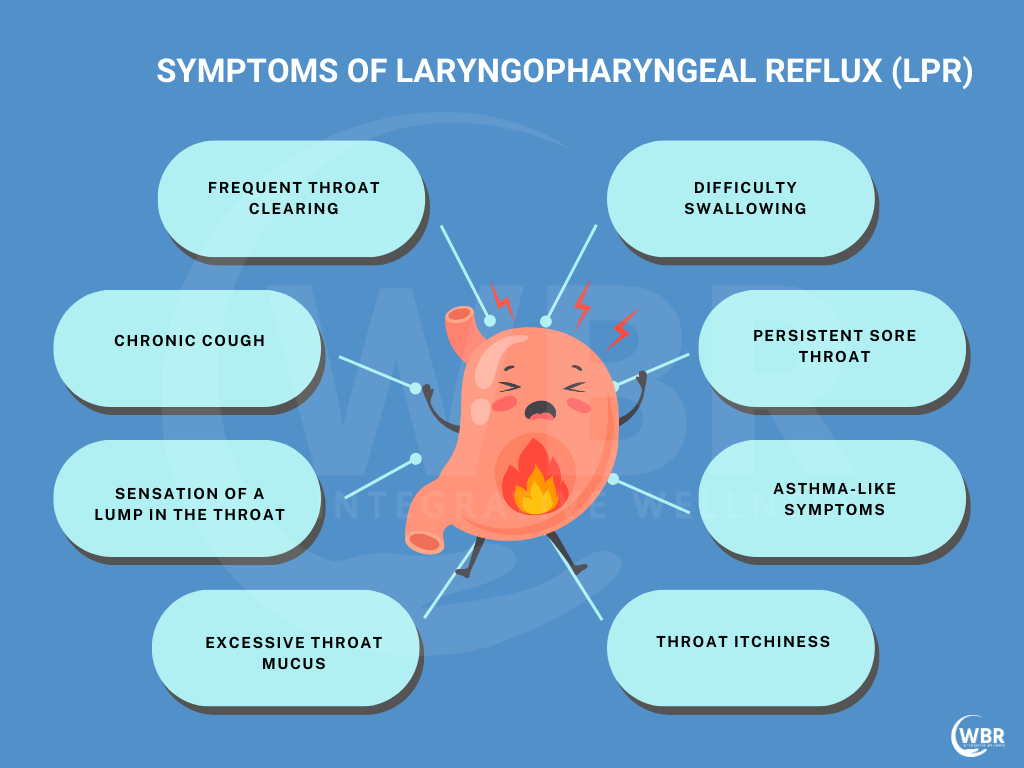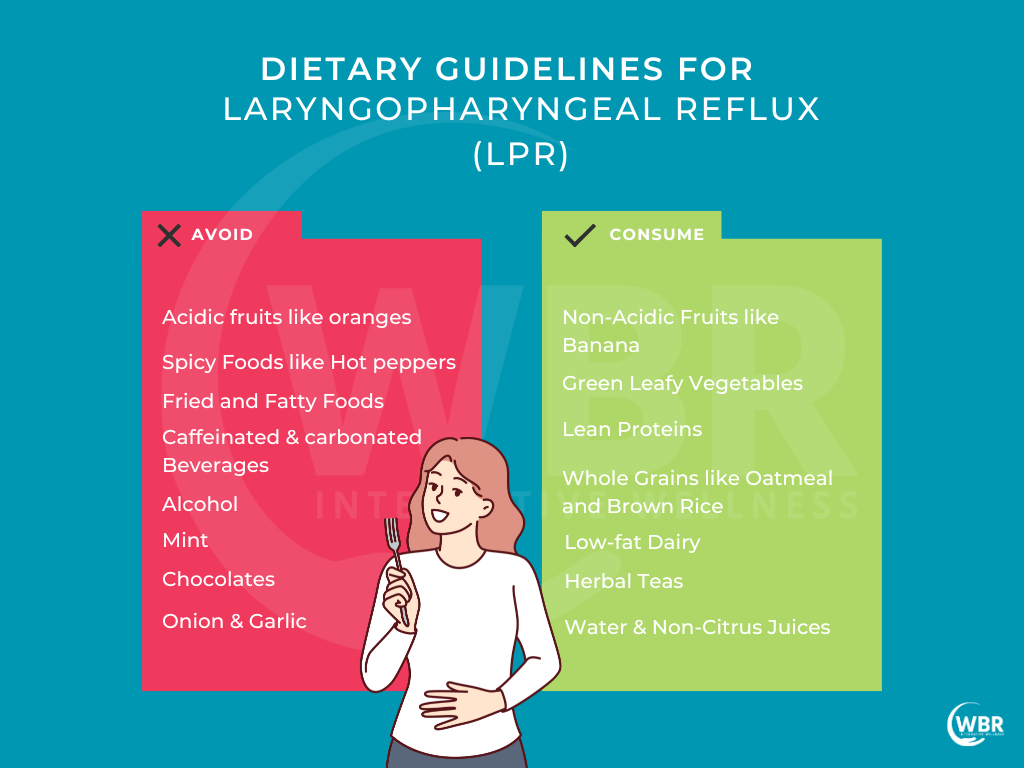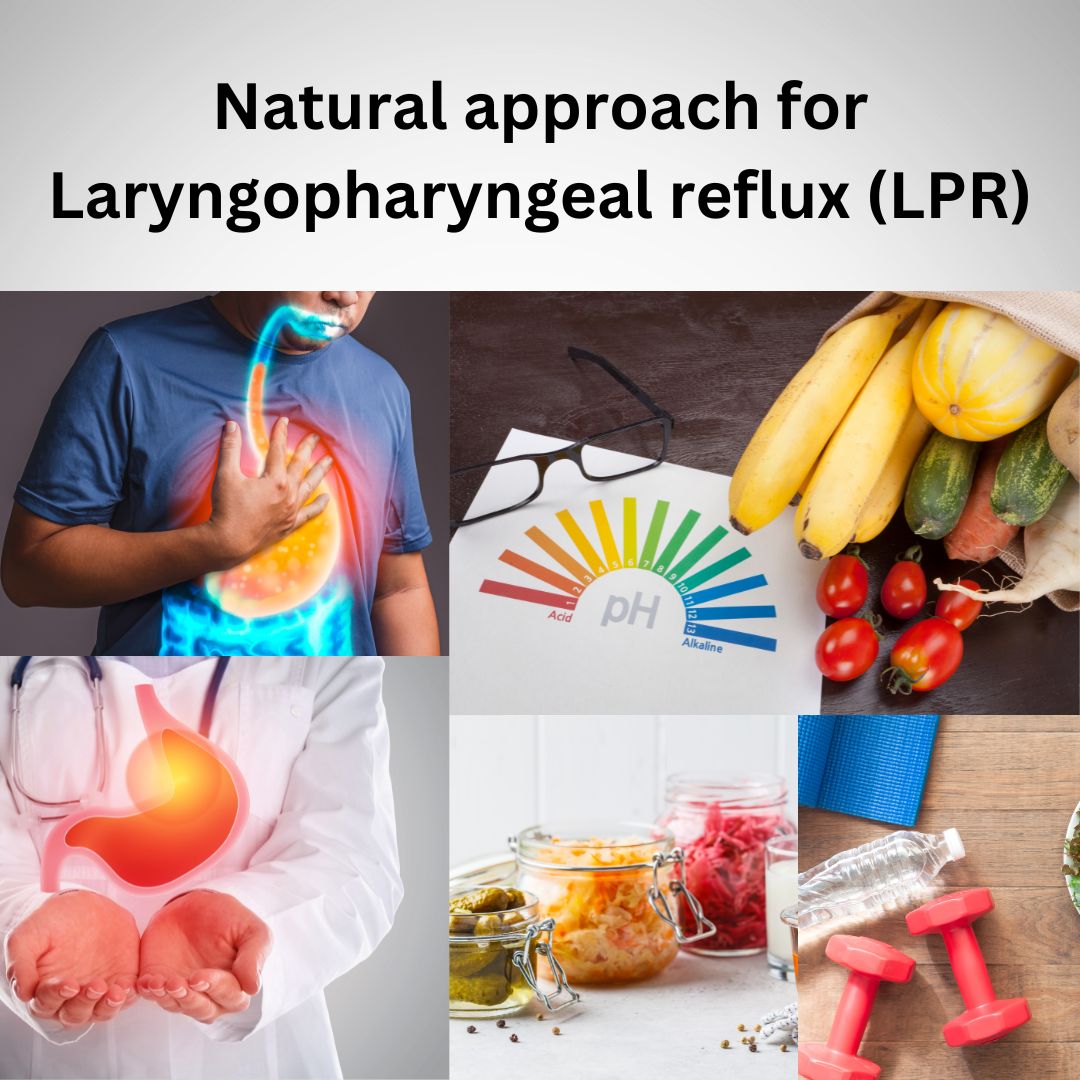Natural approach for Laryngopharyngeal Reflux (LPR)
Laryngopharyngeal Reflux (LPR), often referred to as “silent reflux,” is a condition that affects millions of people worldwide. Unlike the more familiar gastroesophageal reflux disease (GERD), LPR doesn’t always present with heartburn, making it more difficult to diagnose. Instead, it shows up through a variety of symptoms such as often throat clearing, long term cough, and hoarseness.
LPR often goes undiagnosed or is mistaken for other conditions such as allergies, sinusitis, or even asthma. Fortunately, there are effective natural approaches to managing LPR that focus on dietary changes, lifestyle adjustments, and natural remedies. In this blog, we will delve into these natural strategies for managing LPR, offering you practical tips and insights to help you take control of your health. Whether you’re looking to complement your current treatment or seeking an alternative to medication, these natural approaches could make a significant difference in your journey to relief and recovery.
What is Laryngopharyngeal reflux or LPR?
Laryngopharyngeal Reflux (LPR) is a condition where the contents of the stomach, including acid and pepsin, flow back into the throat (larynx) and voice box (pharynx). Unlike gastroesophageal reflux disease (GERD), which mainly causes heartburn, LPR often does not produce typical heartburn symptoms and is sometimes referred to as “silent reflux.” Thus, this makes it harder to diagnose and often leads to it being mistaken for other conditions such as allergies, sinusitis, or asthma.
Differentiation between LPR and Gastroesophageal Reflux Disease (GERD)
Laryngopharyngeal Reflux (LPR) and Gastroesophageal Reflux Disease (GERD) are often mistaken for one another, but they have distinct differences that impact their diagnosis and treatment.
One of the primary differences lies in when the reflux occurs and the symptoms it produces. LPR predominantly happens during the daytime when a person is upright, which is why it is sometimes referred to as “upright reflux.” In contrast, GERD often occurs at night when a person is lying down. Furthermore, in GERD, the primary culprit is stomach acid, which irritates and damages the lining of the oesophagus. However, in LPR, the damage is mainly caused by pepsin, a digestive enzyme. Pepsin remains active even at a relatively high pH of up to 6.5, meaning that even foods that are only mildly acidic trigger symptoms and cause damage to the laryngeal tissues. This makes managing LPR particularly challenging, as it requires careful attention to the acidity of foods consumed
Causes of LPR
As we have already discussed, Laryngopharyngeal Reflux or LPR occurs when stomach contents backflow into the larynx and pharynx due to dysfunction in the lower oesophagal sphincter (LES) and upper oesophagal sphincter (UES). Several factors contribute to this condition:
- Sphincter Dysfunction: Weakness or relaxation of the LES and UES allows stomach acid and pepsin to reach the throat and larynx.
- GUT Dysbiosis: H.Pylori overgrowth, SIBO and other opportunistic overgrowth. Vagal reflex can be triggered by SIBO.
- Hiatus Hernia: A condition where part of the stomach pushes through the diaphragm, increasing the likelihood of reflux.
- Obesity: Excess weight increases abdominal pressure, promoting reflux.
- Pregnancy: Hormonal changes and increased abdominal pressure during pregnancy lead to LPR.
- Dietary Factors: Consuming acidic or spicy foods, carbonated beverages, and large meals triggers reflux.
- Lifestyle Factors: Smoking, alcohol consumption, and high-stress levels exacerbate symptoms.
- Physical Posture: LPR often occurs during the daytime when individuals are upright, as opposed to nighttime reflux seen in GERD.
Understanding these causes helps in managing and preventing LPR through lifestyle changes and medical interventions.

Dietary Management for Laryngopharyngeal Reflux
Diet plays a crucial role in managing Laryngopharyngeal Reflux (LPR). Since LPR involves the backflow of stomach contents into the larynx and pharynx, controlling what and when you eat significantly reduces symptoms and prevents damage to sensitive tissues. By avoiding certain trigger foods and adopting a specific dietary approach, LPR becomes manageable resulting in an improved quality of life.
Foods to Avoid
- Carbonated Beverages
- Why to Avoid: Carbonated drinks cause bloating and increase intra-abdominal pressure, leading to more frequent reflux episodes. The carbonation also relaxes the lower oesophagal sphincter (LES), making it easier for stomach contents to travel back up.
- Foods with a pH Below 5.0
- Why to Avoid: Acidic foods trigger symptoms by irritating the already sensitive tissues of the larynx and pharynx. Moreover, Pepsin, an enzyme responsible for the damage in LPR, remains active at a pH of up to 6.5, making even mildly acidic foods problematic. Examples include citrus fruits, tomatoes, and vinegar-based products.
- Certain Non-Acidic Foods
- Why to Avoid: Some non-acidic foods also trigger LPR symptoms despite their pH levels. For instance, eggs and red apples have been reported to cause discomfort in some individuals with LPR, possibly due to their specific protein content or other components that relax the LES or increase mucus production.
Suggested Dietary Approach for Managing Laryngopharyngeal Reflux
Adopting a dietary approach tailored to minimize LPR symptoms is highly effective. Here are some guidelines:
- Low-Acid Diet: Focus on consuming foods with a higher pH to avoid activating pepsin. Alkaline foods also help neutralize stomach acid and reduce irritation.
- Smaller, Frequent Meals: Eating smaller portions more frequently helps prevent the stomach from becoming too full, which reduces pressure on the LES.
- Timing of Meals: Avoid eating within three hours of bedtime to prevent nighttime reflux.
- Hydration: Drink plenty of water throughout the day to help dilute stomach acid and aid digestion.
- Lean Proteins: Include lean meats, fish, and plant-based proteins that are less likely to trigger reflux.
- High-Fiber Foods: Incorporate vegetables, whole grains, and legumes to support healthy digestion and prevent constipation, which exacerbates reflux symptoms.

Natural Remedies
Managing Laryngopharyngeal Reflux (LPR) through natural remedies is an effective and complementary approach to conventional treatments. Natural remedies focus on improving overall gut health, reducing inflammation, and neutralizing stomach acids without the side effects often associated with medications. Here are some of the most effective natural remedies for LPR.
Mastic Gum: Mastic gum is a resin obtained from the mastic tree and has been traditionally used for gastrointestinal disorders. It has antibacterial properties that help reduce Helicobacter pylori, a bacterium linked to reflux and ulcers. Mastic gum also stimulates saliva production, which often helps neutralize stomach acids.
Xylitol: Xylitol is a natural sugar alcohol found in many fruits and vegetables. It is commonly used as a sugar substitute. Xylitol raises the pH level of saliva, making it more alkaline. This also helps neutralize stomach acid and reduce the activation of pepsin, which is crucial in LPR management.
Deglycyrrhizinated Licorice (DGL): DGL supplements help strengthen the mucosal membrane, reducing inflammation and soothing the throat. This makes it an effective natural remedy for Laryngopharyngeal Reflux (LPR) by alleviating symptoms like throat irritation and acid reflux.
Slippery Elm (Ulmas Rubra): The inner bark of Slippery Elm has a soothing effect on the throat. It forms a protective layer on the mucosal membrane, reducing irritation and inflammation, making it beneficial for managing Laryngopharyngeal Reflux (LPR) symptoms.
Probiotics for Managing Laryngopharyngeal Reflux
Probiotics are live microorganisms that provide health benefits when consumed in adequate amounts. They help maintain a healthy balance of gut bacteria, which is essential for proper digestion and overall gut health. A balanced gut microbiome prevents the overgrowth of harmful bacteria that contribute to Laryngopharyngeal Reflux symptoms. Furthermore, probiotics reduce inflammation in the gastrointestinal tract, which often helps alleviate symptoms of LPR. They also improve the integrity of the gut lining, preventing the backflow of stomach contents. Certain strains of probiotics, such as Lactobacillus acidophilus and Bifidobacterium, are particularly effective in reducing reflux symptoms.
Probiotic Supplements: Probiotics are often taken in supplement form, with typical doses ranging from 50 to 100 billion CFUs (colony-forming units) per day. It’s essential to choose a high-quality product with a variety of strains.
Fermented Foods: Incorporating fermented foods like yoghurt, kefir, sauerkraut, kimchi, and kombucha into the diet provide natural sources of probiotics. These foods support gut health and can help manage LPR symptoms.
Lifestyle Adjustments
Weight Loss for Obese Individuals: Reducing body weight decreases abdominal pressure, improves lower oesophagal sphincter (LES) function, and reduces LPR symptoms. Even modest weight loss significantly alleviates reflux.
Positional Therapy: Adjusting sleep positions can significantly reduce LPR symptoms, particularly during nighttime.
Raising the Head of the Bed: Elevating the bed by 6-8 inches helps prevent stomach contents from refluxing into the oesophagus, utilising gravity to reduce nighttime reflux.
Sleeping on the Left Side This position lowers the likelihood of reflux as the stomach is positioned below the oesophagus, reducing acid flow back into the throat.
Avoidance of Smoking and Stress: Smoking weakens the LES, increases stomach acid production and directly irritates the throat, exacerbating LPR symptoms like hoarseness and chronic cough.
Impact of Stress on LPR Symptoms: Stress increases acid production, delays stomach emptying, and causes muscle tension, all contributing to heightened LPR symptoms. Managing stress through relaxation techniques is crucial.
Nutrients to Focus On for Managing Laryngopharyngeal Reflux
Magnesium and Vitamin D: These nutrients are essential for bone health and muscle function, including the muscles involved in swallowing and digestion.
Vitamins B and C: These nutrients are vital for immune function, tissue repair, and reducing inflammation, which help alleviate LPR symptoms.
Zinc: It supports immune function and tissue healing, potentially reducing throat irritation from Laryngopharyngeal Reflux.
General Health Tips
Importance of Maintaining Overall Health: Good overall health strengthens the immune system and aids in managing and preventing LPR symptoms.
Balanced Diet Recommendations: A balanced diet rich in fruits, vegetables, whole grains, and lean proteins supports digestive health and reduces LPR triggers.
Ensuring Adequate Rest and Sleep: Adequate rest helps the body heal and reduces stress, which can lower acid production and alleviate LPR symptoms.
Engaging in Regular Exercise: Regular physical activity promotes healthy digestion and weight management, both crucial for managing LPR.
Suggested Exercises Low-impact activities like walking, jogging, and stair climbing improve overall fitness without aggravating LPR symptoms.
Limiting Alcohol Consumption: Alcohol relaxes the LES and increases stomach acid production, so limiting intake helps reduce reflux episodes.
Avoiding Smoking: Smoking weakens the LES, increases acid production, and irritates the throat, exacerbating LPR symptoms.
Conclusion
Managing Laryngopharyngeal Reflux (LPR) requires a comprehensive approach that includes dietary management, natural remedies, lifestyle adjustments, and maintaining overall health. By avoiding trigger foods, incorporating natural solutions like mastic gum and probiotics, and making necessary lifestyle changes, many patients have effectively reduced and managde LPR symptoms. Regular exercise, adequate rest, and focus on essential nutrients also play a crucial role in overall health and LPR management. Embracing these strategies significantly improves the quality of life for those affected by LPR, offering a natural and holistic pathway to relief and well-being.










David Simpson
23-Dec-24Thank you very much for your information. Very helpful!
Wellness By Rosh
3-Mar-25You are most welcome David. I hope you had subscribed to receive future updates on webinar and blogs.